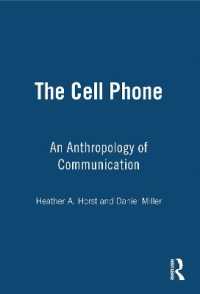- ホーム
- > 洋書
- > 英文書
- > Nature / Ecology
基本説明
Examines how IWC policy dramatically shifted from furthering the interests of whaling nations to eventually banning all commercial whaling, focusing on the epistemological problems encountered in the production of "truth."
Full Description
In this intriguing study, Michael Heazle examines how International Whaling Commission (IWC) policy dramatically shifted from furthering the interests of whaling nations to eventually banning all commercial whaling. Focusing on the internal workings of a single organization, Heazle explores the impact of political and economic imperatives on the production and interpretation of scientific research and advice.
Central to his work are the epistemological problems encountered in the production of "truth." Science does not produce incontestable facts that can be expected to lead to consensus decisions; rather, the problematic nature of knowledge itself allows for various interpretations of data depending on the interests of those at the table. It is precisely the nature of scientific knowledge, Heazle argues, that has made uncertainty a tool in service of political objectives. When scientific advice to whaling nations could not with absolute certainty declare whaling practices a threat to stocks, those IWC members with substantial investments of political and economic capital used this uncertainty to reject a reduction in quotas. As perceptions of whaling changed - with the collapse of Antarctic whaling stocks, further diminishing economic returns, and public opinion turning against commercial whaling -- uncertainty switched sides. Nonwhaling members in the IWC, a majority by the late 1970s, claimed that because scientific data could not prove that commercial whaling was sustainable, hunting should stop. Uncertainty was used to protect the resource rather than the industry.
That science cannot be an impartial determinant in policy-making decisions does not render it useless. But Heazle's analysis does suggest that without understanding the role of scientific uncertainty - and the political purposes for which it is used - international cooperation on wildlife management and broader issues will continue to become bogged down in arguments over whose science is correct.
Contents
Acknowledgments
List of Abbreviations
1. Introduction
2. The IWC 1949-59: An Exercise in Uncertainty Becoming Certainty
3. The Antarctic Collapse: Uncertainty Takes a (Brief) Holiday
4. The Worm Turns: The IWC's Reinterpretation of Uncertainty
5. Scientific Uncertainty and the Evolution of the Superwhale
6. Conclusion
Appendix
Notes
Bibliography
Index








